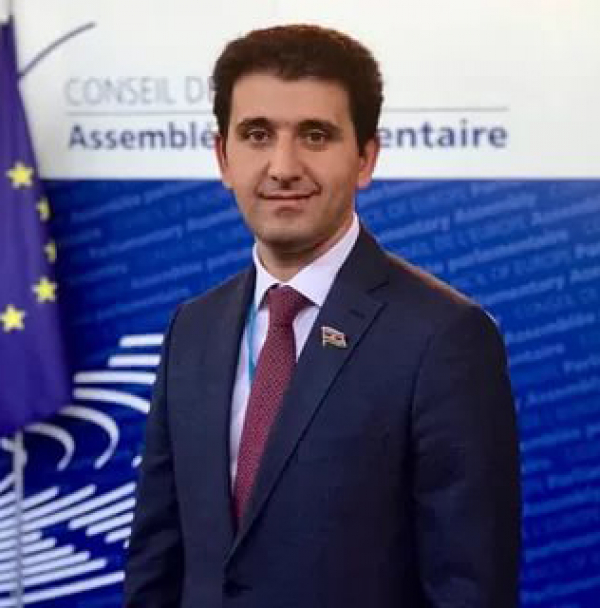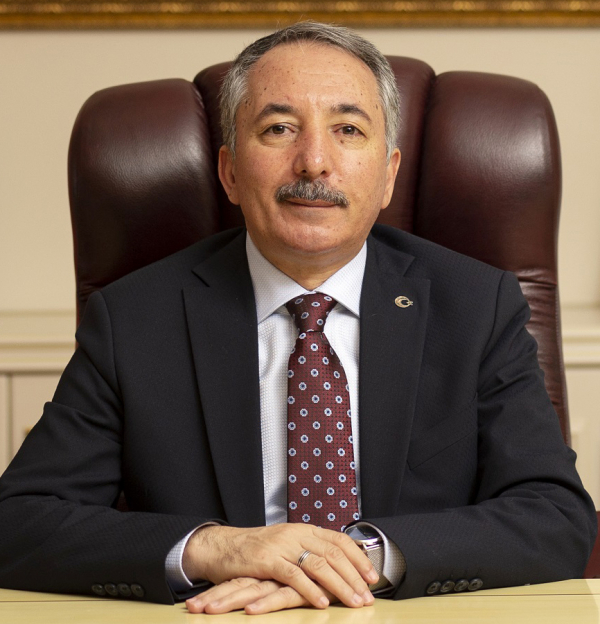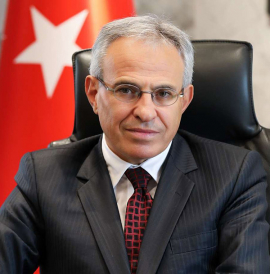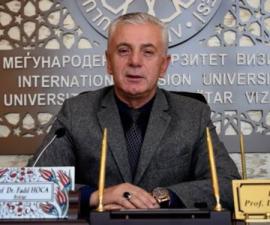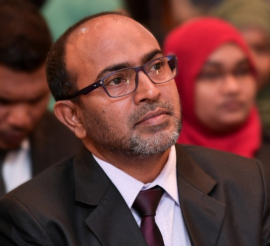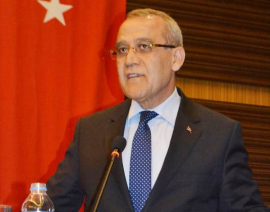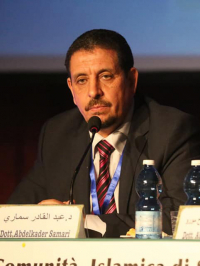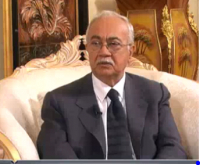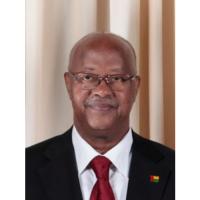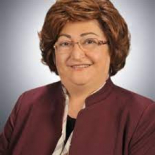
Danışma (12)
Nagif Alashraf oglu Hamzayev (Azerbaijani: Naqif Ələşrəf oğlu Həmzəyev) has been a Deputy in the National Assembly of Azerbaijan since 2015. He is an Azerbaijani politician and Chairman of the New Azerbaijan Party (NAP) Ganja city organization.
Biography
Nagif Hamzayev was born on May 24, 1983, in Narimanli, Vardenis, Armenian SSR. In 2000, he graduated from the secondary school number 2 named after Ahmad Javad in the city of Ganja.
In 2000, he entered the Baku State University History department. Since his university years, he was an active student in social activities. He is a co-founder of the association World Union of Azerbaijani Youth. Hamzayev participated in many international conferences and scientific events representing Azerbaijan.
Hamzayev continued his education at Baku State University (2004–2006) where he received his Master's Degree in History in 2006. From May to September 2009 he worked as a specialist in the Department of Information and Communication Technologies at Ganja State University.
From February 2009, he was a specialist in the Department of International Relations at the Azerbaijan State Agricultural University. From 2010 to 2011, he was a director at the Centre of Information and Communication Technologies at the Azerbaijan State Agricultural University.
In 2012, he entered the PhD program in History of the Faculty of Social Sciences Institute at Firat University in Turkey.
Political career
From 2013 to 2014, he was the Deputy Head of the Executive Power of Kapaz District of Ganja city. On August 1, 2013, he was elected Chairman in the 8th conference of the New Azerbaijan Party Ganja city organization.
On March 19, 2015, he was elected First Deputy Head of the Executive Power of Ganja city. On October 1, 2015, he was elected a Deputy of Milli Mejlis of the Republic of Azerbaijan.
On February 9, 2020, he was elected Deputy of the Milli Majlis of the Republic of Azerbaijan for the VI convocation. Currently, Hamzayev is the chairman of the New Azerbaijan Party (NAP) Ganja city organization.
He is a member of the Milli Mejlis Committee on Human Rights and Committee on Natural Resources, Energy and Ecology. Also, he is a representative for the inter-parliamentary friendship groups Azerbaijan–Israel, Azerbaijan–China, Azerbaijan–Georgia, Azerbaijan–Kazakhstan, Azerbaijan–Czech, Azerbaijan–India, Azerbaijan–Korea, Azerbaijan–Turkey, Azerbaijan–Ukraine, Azerbaijan–Hungary, Azerbaijan–Sweden, Azerbaijan–Portugal, and Azerbaijan–Slovenia.
From May 2018, he has been a member of the Azerbaijan delegation to the Parliamentary Assembly of the Council of Europe.
Nagif Hamzayev is fluent in Azerbijani, English, Russian, and Turkish.
Personal life
Nagif Hamzayev is married and has two children.
Prof. Dr. Abdulhalık Karabulut, 1968 yılında Erzurum’un Tekman İlçesi Taşkesen Köyünde doğdu. 1989 yılında Atatürk Üniversitesi Fen-Edebiyat Fakültesi Fizik Bölümü’nden mezun oldu. 1990’da Atatürk Üniversitesi Fen-Edebiyat Fakültesi Fizik Bölümü’nde araştırma görevlisi, 1997’de yardımcı doçent, 2000’de doçent oldu. 23.01.2006 Atom ve Molekül Fiziği Anabilim Dalında profesör oldu.
2008–2010 yıllarında Ağrı İbrahim Çeçen Üniversitesi, Rektör Yardımcılığı ve Fen Edebiyat Fakültesi Kurucu Dekanlığı görevlerinde bulundu. Aynı yıllarda Ağrı İbrahim Çeçen Üniversitesi Üniversitelerarası Kurul (ÜAK) Üyeliği yaptı. 2011-2012 yıllarında Erzurum Teknik Üniversitesi, Rektör Yardımcılığı ve Erzurum Teknik Üniversitesi Üniversitelerarası Kurul (ÜAK) Üyeliği yaptı.
04.10.2016-21.01.2017 tarihlerinde Atatürk Üniversitesi Fen Fakültesi Dekan Vekilliği yaptı. 21.01.2017 tarihinde Türkiye Cumhuriyeti Anayasası 130’uncu ve 2547 sayılı Yükseköğretim Kanunu uyarınca Cumhurbaşkanımız Erdoğan tarafından Ağrı İbrahim Çeçen Üniversitesi Rektörlüğüne atandı. İngilizce bilmekte olup evli ve 3 çocuk babasıdır.
Bilimsel Çalışmalar
Fen Bilimleri alanında ilk olarak verilen en fazla yurt dışı yayın ödülünü almıştır. (Atatürk Üniversitesi, 2000).
TÜBİTAK projelerinde yürütücü ve araştırmacı olarak görev almıştır.
Birçok Üniversite Bilimsel Araştırma Projelerinde (BAP) yürütücü / araştırmacı olarak görev almıştır.
Ulusal/uluslararası sempozyumlarda Bilim, Danışma ve Düzenleme Kurulu Üyeliği yapmıştır.
Ulusal ve SCI kapsamındaki dergilerde hakemlik yapmaktadır.
Aslen Kahramanmaraş doğumlu olan ve1988 yılında İstanbul Üniversitesinde Kamu Yönetimi bölümüne başlayan Prof. Dr. Arif Özaydın buradan 1992'de mezun oldu. Yüksek Lisansını da İstanbul Üniversitesinde Çalışma Ekonomisi üzerine yapan Özaydın, Doktorasını da İstanbul Üniversitesinde tamamladı. 1994 yılında Çalışma Ekonomisi ve Endüstri İlişkileri bölümüyle Doktorasına başlayan Arif Özaydın 1999 yılında bitirdi.
KİTAPLARI
Prof. Dr. Arif Özaydın'ın Ekonomi üzerine 5 adet kitabı bulunmaktadır. Kitapları sırasıyla şöyle:
Bilgi Ekonomisi Kripto Para Ekonomisi
Eleştirel Bir Yaklaşımla Medeniyet ve İktisat
Yenilik Ekonomisi
İstikrarın Şifreleri
Bilgi Ekonomisi: Tanım-Uygulamalar-Örnekler
Prof. Dr. Fadıl Hoca: 1963 Gostivar (Makedonya) doğumludur. Sosyal bilimler üzerinde yüksek lisans eğitimini İstanbul Üniversitesi Edebiyat Fakültesinde, doktora eğitimini ise Üsküp – Kiril ve Metodiy Devlet Üniversitesinde tamamlayıp, öğretim üyesi olarak, Üsküp Kiril ve Metodiy Üniversitesinde ders vermekle birlikte, ADEKSAM – Eğitim ve Kültür merkezinin 2000 – 2004 başkanı ve 2004-2008 MATÜSİTEB’in (Makedonya Türk Sivil Toplum Teşkilatları Birliği) Genel başkanı olarak görev yapmıştır. 2008 – 2012 Türk Demokratik Partisi Danışma Kurul Üyesi olarak görev aldı. Uluslararası Hakemli İlmi Araştırma dergisi “HİKMET”in 2009-2019 tarihleri arasinda genel editörlüğünü yapmıştır. Şimdiye kadar üç farklı kitabı olmakla beraber, değişik ulusal ve uluslararası dergilerde ve farklı dillerde olmak üzere 60’ın üzerinde makale yayımlamıştır. “ŞAR VARDAR” İlim, Kültür ve Sanat Vakfının kurucu üyesidir.
2013 yılında Makedonya Cumhuriyeti. Eğitim Bakanlığı tarafından Makedonya’da yılın akademisyeni seçilmiştir.
2014 yılında, Ankarada Türkiye Halk Kültürü Araştırmaları Kurumu tarafından, Türk Dünyası Kültür Hizmeti ödülüne layık görüldü.
2015 yılında, Prizren’de (Kosova) “Uluslararası Süleyman Brina Balkanlar Türk Kültürü Hizmet Ödülüne” layık görüldü.
Güneydoğu Avrupa Üniversiteler Birliği ACEU’nun 2019-2020 yılı dönem başkanlığını yürütmektedir.
Uluslararası VİZYON Üniversitesinin 2014 yılından itibaren Kurucu Rektör görevini ifa etmektedir.
Evli ve iki çocuk babasıdır.
Yüksek Mahkeme Başkanı, Maldivler
Prof. Dr. Abdurrahman Arıcı, (d. 2 Mayıs 1951, Reyhanlı) Türk hekim, hakem ve siyasetçi.
Tıp Kariyeri
İstanbul Üniversitesi Cerrahpaşa Tıp Fakültesi'ni bitirmiş, Radyoloji dalında uzmanlığını tamamlamıştır. Yozgat ve Rize Devlet Hastanelerinde radyoloji uzmanı olarak çalıştı. Rize ve Antalya İl Sağlık Müdürlüğü, Antalya Atatürk Devlet Hastanesi Başhekimliği görevlerini yürütmüştür.
Spor Kariyeri
Futbol hakemliği yaptı. Süper Lig Gözlemciliği, Türkiye Futbol Federasyonu Merkez Hakem Kurulu Üyeliği, Türkiye Faal Futbol Hakemleri ve Gözlemcileri Derneği (TFFHGD) Rize, Yozgat Kurucu Başkanlığı ve Dernek Genel Merkez Genel Başkan Yardımcılığı görevlerinde bulunmuştur. 2012 yılı itibarıyla TFFHGD başkanıdır. Temmuz 2015 tarihi itibarıyla TFF Temsilciler Kurulu başkanıdır.
Siyasi Kariyeri
TBMM 23. Dönem Adalet ve Kalkınma Partisi Antalya milletvekili olmuş, 2011-2015 yıllarında Kültür ve Turizm Bakan Yardımcısı olarak görev yapmıştır.
Evli ve 3 çocuk babasıdır.
Prof. Dr. Abdurrahman Arıcı, (d. 2 Mayıs 1951, Reyhanlı) Türk hekim, hakem ve siyasetçi.
Cezayir İktisat Eski Bakanı Prof. Dr. Abdelkader Sammari
Abdulhaluk Mehmet Çay (d. 23 Aralık 1945, İskilip), Türk akademisyen ve siyasetçi. Türkçü kimliği ve çalışmalarıyla tanınmıştır.
Çocukluğu ve eğitim yılları
İlk ve orta Öğrenimini İskilip'te, lise Eğitimini Amasya'da tamamladı. 1970 yılında İstanbul Üniversitesi Edebiyat Fakültesi Tarih Bölümünden mezun oldu.
Akademik hayatı
Tarih öğretmeni olarak başlayan akademik hayatı boyunca çeşitli lise, enstitü ve üniversitelerde öğretmen ve/veya yönetici olarak görev yapmıştır.
Siyasi hayatı
1963 yılından bu yana, Milliyetçi Hareket Partisi'nin çeşitli kademelerinde görev almıştır. Partinin temel ideolojisinin teorisyenlerinden biri olarak kabul edilir.
24 Aralık 1995'teki Milletvekili Genel Seçimleri'nde, MHP'den Gaziantep milletvekili adayı oldu. Ancak parti seçim barajını geçemediği için seçilemedi.
18 Nisan 1999 Milletvekili Genel Seçimleri'nde Çorum Milletvekili olarak TBMM'ye girdi ve Bülent Ecevit'in kurduğu 57. Hükümet'teki Türk Cumhuriyetleri ve Akraba Toplulukları ile Koordinasyondan Sorumlu Devlet Bakanı görevine getirildi.[2] Bu görev MHP'de bulunduğu son görev olmuştur. Parti Genel Başkanı Devlet Bahçeli ile yaşadığı anlaşmazlık neticesinde istifa etmesi beklenmiş, ancak kendisi istifa etmeyince bakanlıktan azledilmiştir.
3 Kasım 2002 Milletvekili Genel Seçimleri'nde parti değiştirerek DYP'den Gaziantep milletvekili adayı olmuş, ancak parti seçim barajını geçemediği için seçilememiştir.
22 Temmuz 2007 Milletvekili Genel Seçimleri'nde BBP'den milletvekili adayı olmuş ancak partinin bağımsız olarak seçime gitme kararı alması üzerine adaylıktan çekilmiştir ve BBP'den istifa etmiştir.
Türk Dünyası çalışmaları
Çay, Türk Devlet ve Toplulukları Dostluk, Kardeşlik ve İşbirliği Vakfı Genel Sekreterliğini yürüttü. Türkeş'in ölümüyle Yönetim Kurulu Başkanlığına getirildi. Bu vakıfın organize ettiği, ilki 1992 senesinde Antalya'da düzenlenen Türk Halkları ve Akraba Toplulukları Dostluk ve İşbirliği Kurultayları'nın organizatörü ve uygulayıcısı olmuştur.
Kitapları
Ali Suavi'nin Hive Hanlığı ve Türkistan'da Rus Yayılması, Orkun, İstanbul, 1977.
Makaleler VII, Kültür Bakanlığı Yayınları, Ankara, 1982. (Kitabın yazarı Ziya Gökalp'tir. Derleyen Abdulhaluk Mehmet Çay'dır.)
Anadolu'da Türk Damgası, Türk Kültürünü Araştırma Enstitüsü Yayınları, Ankara, 1983.
Nevruz, Türk Kültürünü Araştırma Enstitüsü, Ankara, 1984.
Anadolu'nun Türkleşmesinde Dönüm Noktası, Orkun Yayınevi, İstanbul, 1984.
Doğu ve Güneydoğu Anadolu'nun Kültürel Yapısı, Anadolu Basın Birliği Kültür Yayınları, Ankara, 1986.
II. Kılıç Arslan, Kültür ve Turizm Bakanlığı Yayınları, Ankara, 1987.
Kıbrıs'ta Kanlı Noel - 1963, Türk Kültürünü Araştırma Enstitüsü, Ankara, 1989.
Hıdırellez, Kültür Bakanlığı, Ankara, 1990.
Türk Millî Kültüründe Hayvan Motifleri -I-, Türk Kültürünü Araştırma Enstitüsü Yayınları, Ankara, 1990.
Doğu ve Güneydoğu Anadolu'da Kuvay-ı Millîye Hareketleri, Türk Kültürünü Araştırma Enstitüsü Yayınları, Ankara, 1990. (Abdulhaluk Mehmet Çay, Yaşar Kalafat)
Doğu ve Güneydoğu Anadolu Üzerine Araştırmalar III, Boğaziçi Yayınları, Ankara, 1992. (Abdulhaluk Mehmet Çay, Dursun Yıldırım, Fahri Unan, Enis Öksüz, Suat Akgül)
Her Yönüyle Kürt Dosyası, Boğaziçi Yayınları, Ankara, 1993.
Türkmenistan Emiri Temür'ün Türk Ve Dünya Tarihindeki Yeri, Türk Devlet ve Toplulukları Dostluk, Kardeşlik ve İşbirliği Vakfı, Ankara, 1998. (Abdulhaluk Mehmet Çay, Atilla Şimşek)
5. Türk Devlet ve Toplulukları Dostluk, Kardeşlik ve İşbirliği Kurultayı, Türk Devlet ve Toplulukları Dostluk Kardeşlik ve İşbirliği Vakfı, Ankara, 1998. (Kitabı hazırlayanlar Abdulhaluk Mehmet Çay ve Attila Şimşek'tir.)
7. Türk Devlet ve Toplulukları Dostluk, Kardeşlik ve İşbirliği Kurultayı, Türk Devlet ve Toplulukları Dostluk Kardeşlik ve İşbirliği Vakfı, Ankara, 1999. (Kitabı hazırlayan Abdulhaluk Mehmet Çay'dır.)
8. Türk Devlet ve Toplulukları Dostluk, Kardeşlik ve İşbirliği Kurultayı, Türk Devlet ve Toplulukları Dostluk Kardeşlik ve İşbirliği Vakfı, Ankara, 2001. (Kitabı hazırlayanlar Abdulhaluk Mehmet Çay ve Atilla Şimşek)
Türk Cumhuriyetleri ve Akraba Toplulukları ile Koordinasyondan Sorumlu Devlet Bakanlığı'nın Faaliyet Raporu, Tamga Yayıncılık, Ankara, 2000. (2 cilt)
Tarihte Türkler ve Alparslan Türkeş, Berikan Yayınevi, 2003 (Kitabın yazarları Edip Semih Yalçın ve Abdulhaluk Mehmet Çay'dır.)
Türkistan Millî Kurtuluş Hareketi, Bilge Kültür Sanat, 2015. (Kitabın yazarı Joseph Castagne'dir. Kitabı çeviren M. Reşat Uzmen'dir. Hazırlayan ise Abdulhaluk Mehmet Çay'dır.)
Carlos Domingos Gomes Júnior (d. 19 Aralık 1949), Gine-Bissau eski Başbakanı. Carlos Gomes daha önce 10 Mayıs 2004 - 2 Kasım 2005 tarihlerinde Başbakan oldu ve yine 25 Aralık 2008 tarihinde bu göreve atandı. Carlos Gomes 2002 yılından bu yana "Cadogo" olarak bilinen Gine ve Cape Verde (PAIGC) Kurtuluş Afrika Partisi Başkanıdır.
10 Şubat 2012 tarihinde başbakanlık görevinden istifa etmiştir.
BU BİLGİLER WIKIPEDIA' DAN ALINMIŞTIR
This name uses Portuguese naming customs: the first or maternal family name is Domingos and the second or paternal family name is Gomes.
Carlos Domingos Gomes Júnior (born December 19, 1949) is a Bissau-Guinean politician who was Prime Minister of Guinea-Bissau from 10 May 2004 to 2 November 2005, and again from 25 December 2008 to 10 February 2012. He has been the President of the African Party for the Independence of Guinea and Cape Verde (PAIGC) since 2002[needs update] and is widely known as "Cadogo". He resigned as prime minister on 10 February 2012 to run in the presidential election triggered by President Malam Bacai Sanhá's death on 9 January.
Background
Gomes was born in Bolama. He was a delegate to PAIGC's Fifth Congress in December 1991, and in the first multiparty elections, held in 1994, he was elected to the National People's Assembly of Guinea-Bissau from the 26th Electoral District. In 1996, he was elected First Vice-President of the National People's Assembly, Second Secretary of the Interparliamentary Committee of the West African Economic and Monetary Union, and Vice-President of the Interparliamentary Committee of the West African Economic and Monetary Union. In the National People's Assembly, he also served as Chairman of the Committee for Economic Affairs and President of the Administrative Council. At PAIGC's Sixth Congress in May 1998, Gomes was elected to the party's Political Bureau, and at the party's Third Extraordinary Congress in September 1999 he was re-elected to the Political Bureau and also became the party's Secretary for Foreign Relations and International Cooperation.
Gomes was elected as President of PAIGC at the Fourth Extraordinary Congress in January–February 2002. He is a banker and businessman, reputed to be the richest man in Guinea-Bissau. PAIGC won the most seats in the March 2004 parliamentary election, and Gomes became Prime Minister in May.
Political life
Prior to the victory of former president Vieira in the mid-2005 presidential election, Gomes said that he would resign if Vieira was elected, referring to the latter as a "bandit and mercenary who betrayed his own people".After Vieira's election, Gomes initially refused to recognize the result, but he also moved away from his earlier threat to resign. Vieira took office on 1 October 2005, and almost two weeks later he and Gomes had a meeting, with Gomes anticipating that the two would be able to work together.However, on 28 October Vieira announced the dissolution of Gomes's government, and a long-time ally of Vieira, Aristides Gomes, was appointed Prime Minister on 2 November 2005.
Following the assassination of former navy commander Mohamed Lamine Sanha in early January 2007, Gomes accused Vieira of involvement in the killing in an interview with Lusa on January 8. A warrant was issued for Gomes's arrest on January 10, and when police tried to arrest him later that day he fled and took refuge in the United Nations building in Bissau. A spokesman for Gomes said that it would be unconstitutional to arrest him because he enjoyed immunity as a member of the National People's Assembly. A presidential spokesman accused Gomes of trying to destabilize the country. Gomes left the UN building on January 29, after the arrest warrant was dropped.
According to Gomes, he was misquoted in the interview that led to the arrest warrant. An investigating judge said that Gomes had not provided any proof for his claim of Vieira's involvement, and on December 20, 2007 it was announced that Gomes had been charged with false testimony and slandering the head of state.
Gomes sought re-election as President of PAIGC at the party's Seventh Ordinary Congress in June–July 2008. Malam Bacai Sanhá, the party's presidential candidate in 2000 and 2005, challenged Gomes for the party leadership, but Gomes was re-elected at the end of the congress on July 1–2, receiving 578 votes against 355 for Sanhá.
2008 election
In the November 2008 legislative election, PAIGC won a majority of 67 out of 100 seats in the National People's Assembly. Gomes himself was elected to a seat as a PAIGC candidate in the 24th constituency, located in Bissau.[15] Following the election, Vieira appointed Gomes as Prime Minister on December 25, 2008. Gomes said on this occasion that his government would focus on "good governance and a reform of the justice system" and that he and Vieira would "put aside any personal differences" in order to work towards solving the country's problems.[3] He was sworn in on January 2, 2009.
2010 military unrest
Following the failure of a coup plot in 2008, Rear Admiral Bubo Na Tchuto escaped to Gambia where he was arrested. Subsequently he clandestinely returned to Guinea-Bissau where he took refuge at a UN compound. The UN agreed to turn him over to the government. Nevertheless, He continued to stay in the compound. On April 1, 2010, soldiers went to the UN office. Bubo Na Tchuto voluntarily left with them. On The same day, soldiers invaded Prime Minister Gomes’ residence and held him there.
Simultaneously, forty military officers, including the head of Guinea-Bissau's armed forces, were held at an army base.
Hundreds of the PM's supporters demanded his release. In response the deputy army chief, Antonio Ndjai, said: "If the people continue to go out into the streets to show their support for Carlos Gomes Junior, then I will kill Carlos Gomes Junior ... or I will send someone to kill him."
2012 election and coup
He resigned as prime minister on 10 February 2012 in order to run in the presidential election. He won the first round and was due to face a runoff against Mohamed Ialá Embaló. Prior to the a second round, a coup against the civilian government resulted in a military takeover of the capital, Bissau, amid reports that he was killed. However, Gomes and President Raimundo Pereira were arrested by the military as gunfire ensued in the capital of Bissau. The Chairperson of the African Union Jean Ping issued a statement rejecting the coup and demanded the release of Pereira and Gomes. The United Nations Security Council issued a statement saying that they "strongly condemn the forcible seizure of power".
On 27 April, the deposed leaders were freed and sent to the Ivory Coast.
Hamadi Jebali (Arabic: حمادي الجبالي, Ḥammādī al-Jibālī; born 12 January 1949) is a Tunisian engineer, Muslim politician and journalist who was Prime Minister of Tunisia from December 2011 to March 2013. He was the Secretary-General of the Ennahda Movement, a moderate Islamic party in Tunisia, until he left his party in December 2014 in the course of the 2014 Tunisian presidential election.
Early life, education and professional life
Born in Sousse in 1949,Jebali received his bachelor's degree in mechanical engineering from the Tunis University and added a masters programme in photovoltaic engineering in Paris, France. As a specialist in solar energy and wind power, he founded his own enterprise in Sousse.
Political and journalistic activity
In 1981 he became involved with Tunisia's Islamist movement, then called Movement of the Islamic Tendency. He was director and editor-in-chief of Al-Fajr (Dawn), the former weekly newspaper of the Islamist Ennahda Party. Moreover, he served as longtime member of the party's executive council and remains secretary-general of Ennahda.
Criminal prosecution and imprisonment
In June 1990, Al-Fajr published an article by Rashid al-Ghannushi called "The people of the State or the State of the People?" Jebali was made responsible for the publication and received a suspended sentence and a 1,500 dinars fine for the offences of "encouraging violation of the law" and "calling for insurrection". In November 1990, the Islamist newspaper contained an essay by the lawyer Mohammed Nouri, entitled "When will military courts, serving as special courts, be abolished?" This time, a military court sentenced Hamadi Jebali to one year in prison for "defamation of a judicial institution".
In May 1992 the government claimed that it had detected plans for a coup d'état by Ennahda, which had allegedly plotted to kill President Ben Ali and establish an Islamic state. In August 1992, Jebali, along with 170 other sympathisers of Ennahda, was charged with "attempted overthrow". Jebali protested that he had no knowledge of the plot's existence, and asserted that he had been tortured, presenting marks on his body for evidence. The trial was classified as unfair by observers for Human Rights Watch, the Lawyer's Committee for Human Rights, and Amnesty International, the latter of which named Jebali a prisoner of conscience. Eventually, on 28 August 1992 Hamadi Jebali was sentenced to a prison term of 16 years for "membership in an illegal organisation" and "attempted change of the nature of the state". The Court of Cassation confirmed the verdict.
The conditions of his imprisonment were harsh. More than ten of the 15 years that Jebali spent, were in solitary confinement. Hamadi Jebali engaged in several hunger strikes to protest against the conditions and his conviction. Two of them lasted for 36 days each. In February 2006, on the occasion of the 50th anniversary of Tunisia's independence, Jebali was conditionally released.
Post-revolution and Prime Minister
Jebali during the WEF 2012
Following the Tunisian revolution in January 2011, Ennahda was legalised. Since then, Hamadi Jebali has been present in public as the party's secretary-general and spokesman. In May 2011, he went to Washington, D.C. in the US at the invitation of the Center for the Study of Islam and Democracy. He also met U.S. Senators John McCain and Joe Lieberman.
Ensuing Ennahda's success in the Constituent Assembly election on 23 October 2011, the party nominated him as its candidate for prime minister. Jebali is considered a proponent of the reformist wing of his party.
Interim President Moncef Marzouki appointed Jebali as Prime Minister of Tunisia on 14 December 2011. He presented his government on 20 December. He officially took office on 24 December.[citation needed]
On 19 February 2013, he resigned from his office. The move followed his attempt to form a technocratic government following the assassination of Chokri Belaid and ensuing protests against the alleged Islamisation of the country. Ennahda, however, rejected his resignation insisting on a government of politicians and Jebali formally resigned after a meeting with President Moncef Marzouki saying it was in the best interests of the country. He said: "I promised if my initiative did not succeed I would resign as head of the government, and this is what I am doing following my meeting with the president. Today there is a great disappointment among the people and we must regain their trust and this resignation is a first step." Party leader Rachid Ghannouchi then suggested a government of politicians and technocrats, while Jebali suggested that if he was tasked with forming a new government it would have to include non-partisan ministers and a variety of political representation that would lead to a new election. Unnamed opposition figures welcomed the resignation. The same day, Standard & Poor downgraded Tunisia's credit rating. However, the IMF said that it was still in talks for a US$1.78 billion loan to the country.
After urging his party without success to support the interim president Moncef Marzouki in the presidential election of 2014, he left Ennahda on 10 December 2014. In January 2015, he refused to join the new party of the losing presidential candidate Marzouki but did not rule out founding a party of his own.


